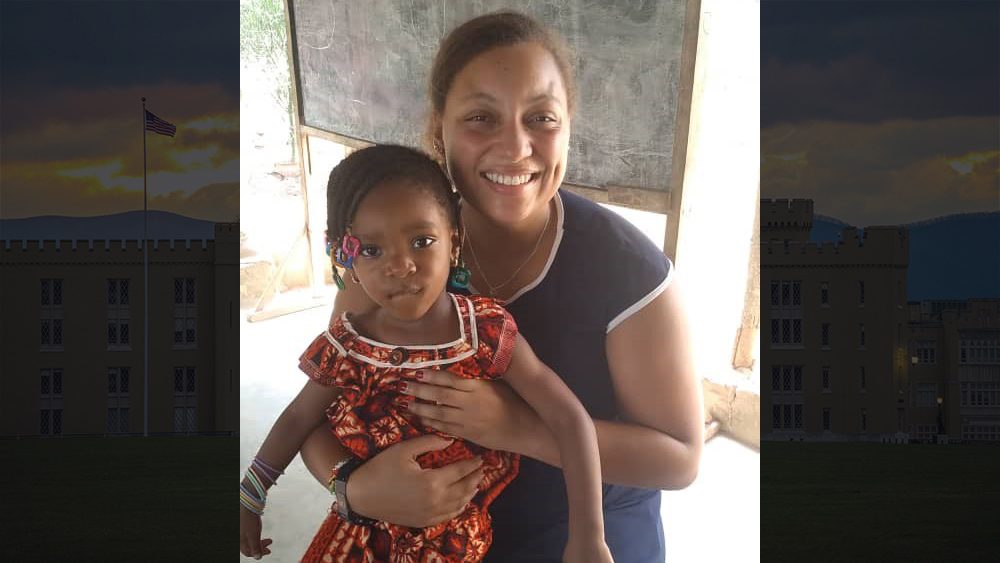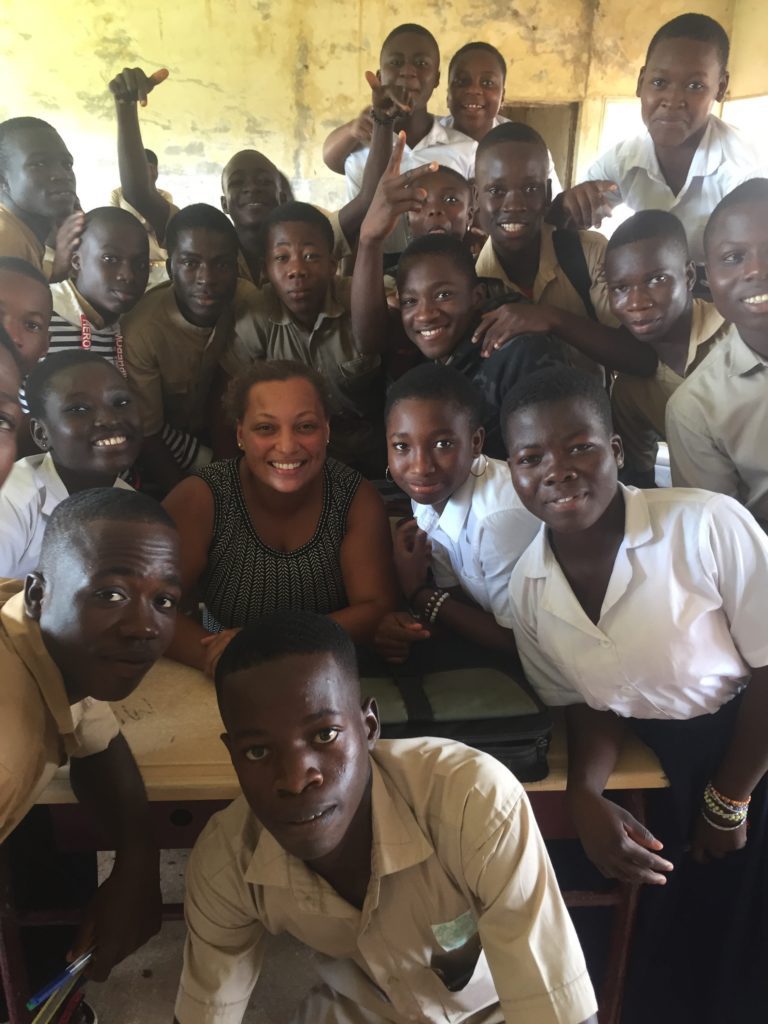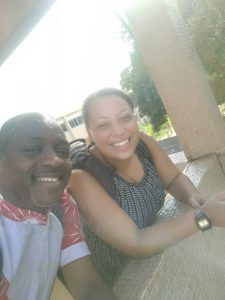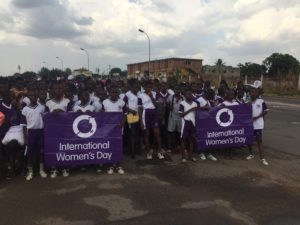Tice ’19: Ivory Coast Learning: A March Towards Solidarity

Annika Tice ’19 spent six months in the Ivory Coast working with students as part of the Fulbright U.S. Student Program.

Annika Tice ’19 spent six months in the Ivory Coast working with students as part of the Fulbright U.S. Student Program.
Editor’s Note: Annika Tice ’19 was awarded a spot in the Fulbright U.S. Student Program during her 1st Class year at VMI. She is one of six VMI alumni to be selected for program, which was signed into law in 1946. Through Fulbright, nearly 2,000 students travel to over 140 countries annually. Each assignment is unique, while adhering to the principle of international partnership. Tice flew to the Ivory Coast in September 2019, planning to spend the next year creating lesson plans and assisting with U.S. embassy-sponsored after school programs at the American Culture Center. While life and society are ever changing for the better, the Ivory Coast is still recovering from unstable government transitions. Women, particularly, are more able to hold jobs and have status in their communities but still do not have the same opportunities available to women in the U.S.
Working with teacher-mentors, Tice taught at the Lycée Mixte 1 school in Yamoussoukro, the capital of the Ivory Coast. The school has around 5,000 students and houses sixth through 12th grades. Classes normally have 70-80 students. COVID-19 necessitated Tice’s early return in March 2020. Below, Tice writes about her experience.
“I’m sorry about the conditions of the school. You can see that it is not good here.” The teachers couldn’t stop apologizing as we moved from room to room to visit the classrooms and students of Lycée Mixte 1. The classrooms were open-air retreats that reminded me of construction projects that were never finished: Door frames without doors, window spaces without shutters and woody dust coating every inch on the floor. Rows of dilapidated benches faced the chalkboard hanging above a teacher’s platform at the front. Seventy to 80 students fell over the edges of the wooden seats or resorted to standing along the back wall. Yet, the state of the classrooms didn’t frighten me as much as avoiding a conversation using my mediocre French. Key phrases from the conversations that I did have with my teachers have helped me hold onto the memories of my experience.

Tice with eighth grade students she taught.
“You will write a report after this or teach?” My mentor teachers had different expectations for my teaching role. At times, school faculty confused me as either a long-term tourist, an outside evaluator, a wanna-be teacher or one of their own high school students. It took nearly a month to communicate otherwise, but my first lesson did not solidify my role. I had my first dose of teaching when I was thrown right into it. I walked into a class of 80 11-year-old students, was handed a book of vocabulary and told to teach. My heart pounded out of my chest as I stared at a page of words themed “My Family Tree.” I hadn’t prepared a lesson, I wasn’t familiar with what I needed to cover and I had 80 eager students staring up at me on that stage. I began to sweat, I could feel my head spinning – but I knew that I couldn’t just walk away. I picked up a piece of white chalk and drew something that resembled a family tree. I was amazed that I came up with something; the students were amazed that I could speak English. We both shared a moment of bewilderment.
The Ivory Coast program description advertised that its Fulbright scholars would work in the secondary school system to assist teachers in classrooms and develop new curricula to supplement current learning. Additionally, scholars were asked to aid in American Culture Center programs by showcasing American culture as we know it to university students and the general public. As a cadet, I designed an action research project: The Rockbridge Girls Leadership Exchange. I used curriculum development to create educational possibilities for girls and young women to pursue as futures. I was compelled to bring what I had learned from RGLE to the Ivory Coast. “Their English … it is not good.” My teacher mentors frequently commented on my students’ capabilities. Despite what my teachers thought of their capabilities, I saw my students’ potential.

Tice with a teacher-mentor in Yamoussoukro.
As a Fulbright Scholar, I found it hard to find my purpose in this context. I questioned whether I was qualified enough to be in charge of so many students. I was often left feeling exhausted and unfulfilled because I had not the slightest clue whether the students were retaining anything or what my relationship should be with them. I thought I could enter their space, inspire them with some innovative learning and leave them with educational strategies. I quickly realized that teaching in the Lycée Mixte 1 was a performing art. I became an actor as I played the roles of teacher, student, friend and honorary guest. I stood on a literal stage ready to use whatever I had in the moment – in most cases, just a chalkboard – to convey my American culture lessons to the students, despite the drastic language barrier. Creative approaches came as responses to my students’ needs. If they didn’t understand, I knew that I would have to find a different way.
I used the lyrics of Jay-Z’s “Empire State of Mind” to think about the progressive qualities of American city life. I fully left my comfort zone when I sang in front of 100 students just to explain the tradition of American Christmas caroling. I was elbow-deep in Elmer’s glue when I made a diorama to show the cycle of natural resources within an ecosystem. I put on my sunglasses and strutted across a classroom to illustrate fashion shows. I did all of this to support, to motivate and to innovate – but most of all to create relationships. My students walked four miles a day to get to school, and I arrived every morning and was honored to be there to take action for and with my students to further their educational experience.
"I was halfway across the world holding social action in my hands. I was building relationships with young people to envision how they could act for their communities."
Annika Tice ’19

Tice marching with students on International Women’s Day.
In March 2020, the voices of both girls and boys echoed down the streets of Yamoussoukro, the capital city of the Ivory Coast. “Vivent les femmes!” Hand-in-hand, we walked down the middle of streets that weren’t blocked off to traffic and demanded that the cars stop to hear our message: Long live women. Many horns honked in solidarity, while some taxi drivers barked over the community takeover. Our vocal parade was nothing like anybody had ever seen before. The body of participants multiplied as we got louder and shouted our excitement for the joyous occasion of being celebrated and starting the first women’s march. It seemed as though there was nothing like it in this community, except for the few school strikes advocating for lower fees and more wooden benches. I remember this day as fondly as my first. I was halfway across the world holding social action in my hands. I was building relationships with young people to envision how they could act for their communities.
Like many have since the emergence of COVID-19, I left Africa in unfortunate circumstances. It was difficult to not be able to say a formal goodbye to Lycée Mixte 1 and the community of Yamoussoukro that I had just invested myself in for six months. But, in some ways, the Ivory Coast followed me back home and stays with me. My phone rings constantly with calls from my closest mentors asking about my health and future plans. My students have invited me into Facebook groups to share homemade grammar lessons. All these gestures were surprising because when I packed my bags, I thought I was saying goodbye to a chapter of my life that I could never return to. After reflecting, I now sense how the experience showed me my capabilities, how to push through tasks that make me uncomfortable, how to keep an open mind and how to use every moment to learn something new.
Whether academic or social, I find learning has a unique quality of continuity. When we are open to taking risks and making mistakes, our age and experiences don’t keep us from continuing to learn. New ideas become important, which in turn, motivate action. Relationships are formed between different worlds and different people, making us all become global citizens. So, my question as a future educator became clearer: How do we help students keep an eye on a journey that has no end, showing them that learning has worth? This Fulbright award helped me to recognize the utmost importance of flexibility and valuing all moments.